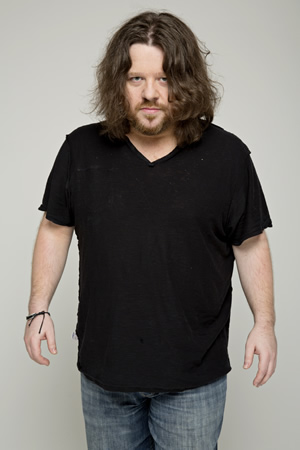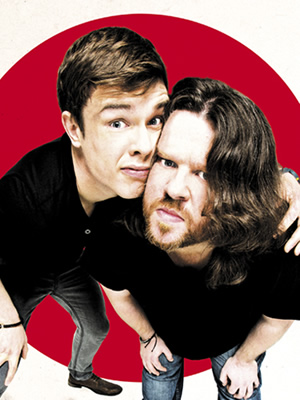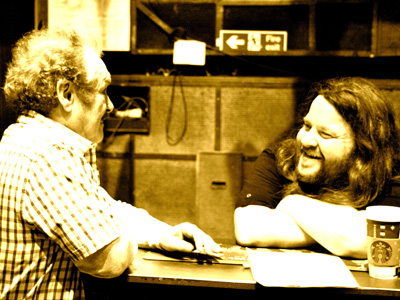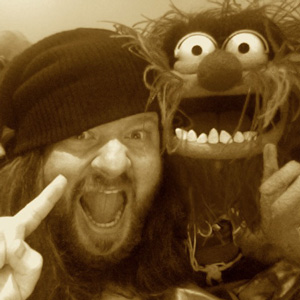Ray Peacock: It's not how you start

As with the 100 metres sprint or an orgy, one of the main challenges in an hour Fringe show is getting the beginning right. It's all very well dismissively saying for ten months that you plan to "banter your way in" come August, but you'll find yourself in July having done a heap of previews, starting to think "I need a beginning and I need it fast".
The problem with banter is it's never, ever guaranteed. You can have all the improv skill in the whole world at your disposal but sometimes it's simply not in the room, and this goes double at the Fringe. See, Fringe audiences are there for a show, and they see it different to being at a comedy club. Not all of them, mind you; you'll still get the odd lost soul wandering in, overexcited and armed with hilarious things they've pre-prepared to shout out because it "helps" the comedian, but as a general rule, it's a comedy savvy audience of ten people who've agreed to risk dehydration as you ply your trade. Therein lies the curse of Fringe audiences - they know the tricks. They're not going to buy you saying you're the bastard child of two people you look ever so slightly similar to, they're not going to give you funny jobs that you can riff on, and they already know it isn't the television and you are there in real life. They get comedy.
So they're waiting for your show, not your club set. And you have written your show (put two club sets together with a tenuous link - naughty!), so how do you start it? You've no compere, "compering yourself on" is risky for the aforementioned reasons, you are starting stone cold and they don't have the same excitement at hearing that music you like so much and strut out to. That won't warm them up.
We'll take a moment now to allow panicking comedians to leave this article as it is just winding them up. Don't read on - go sort it. There's still time. Not much, but some. RUN.
I've personally always stumbled my way into shows, I strive to appear aloof yet confident. Looking like you know what you are doing is as good as knowing what you are doing, just establishing a trust that you will start the show properly when you are in the mood for it. I've blown it on some nights, when I've got under the lights and just started, right off the bat - straight in. This never, ever works for me.
Richard Herring does this, with masses of confidence. He walks on and gets straight to it, I think mainly because he always has too much material and needs to just get it going or he won't get to the end in time and none of us will ever find out who actually ate all the yoghurt or whatever he is banging on about in any given year. He does it very well, but whenever I have been fooled into going to his shows through guilt or obligation, I always struggle to settle as an audience member for a few minutes because I don't feel ready for the show proper. Luckily his fans are idiots and get all excited to see him so laugh anyway. You get a lot of goodwill being the second most popular podcast.
The luxury approach of taking your time does carry the risk of making it very hard to start once you are ready. Even if you manage the banter there is still a jarring gearshift as you go to material, and even if the audience don't spot it you'll still feel it in your own head: that moment that the thought "Okay I'm doing it now" arrives can disrupt you as a comic. All you've actually done is postpone beginning to get a few laughs at how you were in Birmingham last night so it is nice to be anywhere (on a side note, if you do have that as part of your opening bit, it becomes an even worse crime when you have to subtly change it to "I was in Birmingham the week before coming to Edinburgh...", and will sound particularly dreadful come week three, you won't even be able to kid yourself any more by then. Likewise all the funny things you notice about the chip shop in Edinburgh won't translate back into club sets when you return. You'll still do it though won't you? Please don't, I might have to compere you and I won't know where to look. I'll feel dreadful because you're a really nice person off stage but you're turning me into a comedy snob and I hate you for it. I know Birmingham is shit, and I know Scottish chip shops batter everything).
I'm aware that by this stage of this article I am probably coming across as a bit of a dick and the only reason the few of you still reading are doing so is because you think I'm going to reveal the secret of how to start an Edinburgh show at some point. I'm really not. Not because I am selfish but because I haven't the faintest idea how to. I'm genuinely awful at it - as I've said I rely purely on 'charm' and smirks and bumbling with confidence. The only reason I am writing this is because I am also worrying about it.

I've spent the last three years doing Fringe shows with Ed Gamble under the Peacock & Gamble banner, and I have been spoilt. Not just because when audiences didn't go for it we got to look across at each other and stifle naughty boy childish laughter at how stupid we were being in front of the baffled grown ups, but mostly because we had a big screen. Oh it was brilliant. You don't even have to do anything! Get your beginning sorted out on the big screen and you can stand backstage looking at each other and pretending you are going to get your penis out whilst the audience are giggling at something you put together in May.
Last year, in our swansong Heart-Throbs, we didn't even wait for the show to start before the big screen was warming them up for us. We had a film of myself and Ed miming to a Japanese Queen medley (I won't explain this, you should have come to it. And don't think because you now know this you can pretend in five years that you saw Peacock & Gamble at the Fringe long before Ed was famous because we know exactly who came to our shows and have a list of names somewhere). As we mimed along to U~i• u~iru• rokku• yū (We Will Rock You), the audience would start to laugh and by the time we got house clearance, played our animated intro and ran onto the stage we had warmed them up enough to cheer and clap even though they didn't know why they were doing it. Some say having a screen is cheating, and those people can't afford a screen. We got seven minutes of laughs whilst standing behind a curtain.
No screen this year though, back to stand-up. Me and a microphone. Actually I'm not even sure where the screen is. Ed, if you are reading this, have you got it? Last time I saw it was in the back of your car.
So back to this starting a show problem. I've recently been working with Bobby Ball and even though I am saying that matter-of-factly, please do not think that for one second this is ever going to be a phrase I use that won't secretly excite me. I appreciate you may not care, like or even have heard of Cannon & Ball (of which Bob is the Ball part) but they were a big deal to me growing up, they are the spiritual fathers of Peacock & Gamble and are still the funniest double act working in comedy despite being at it for 52 years and counting (BTW, I know I called him Bob and not Bobby earlier, I did it casually but it was sort of deliberate to show that I know him in real life but it gives me the same thrill I get when I refer to Vic Reeves as Jim even though I've only met him once and he really didn't appear to like me very much. For the record, Bob is always "Bobby Ball" in full in my head).

So anyway, you get the idea, I know Bobby Ball but come on, get over it, it's just my mate, but as my mate (best mate? maybe...) we talk loads about comedy and particularly double acts because he likes Peacock & Gamble, and his two sons have a double act together called the Harper Brothers who are ace, and he is also in Cannon & Ball himself, I don't know if I mentioned that. The other day we were talking about this problem of starting a show, of how you get going once you get on stage. Cannon & Ball have long since employed the trick of walking out to their own theme music, accepting the applause and adulation and then berating the audience for not giving them the welcome that they are "used to" regardless of how ecstatic the reception had actually been. So they explain they are going to go off and come back on and could the audience give them "a little bit more", thus ensuring several hundred more decibels of applause a few seconds later and away they go.
Easy trick, works a treat, but they have the earned luxury of being Cannon & Ball. I can't walk onto a stage to reluctant applause and claim to be used to a better reception than that because I'm not, and they know I'm not. I asked Bobby what was the best opening to an act he'd ever seen and he immediately started to chuckle. When Bobby Ball starts to chuckle you know it's going to be good...
He told me of an act from the 1960s or 70s whose name he couldn't recall. If anyone reading this has any idea who this was then do let us know and I'll amend the article to include it, as it seems woefully unfair that somebody capable of something so brilliant should go uncredited.
So what happened was, this thin awkward man would be introduced and walk slowly onto the stage, nervous and apprehensive. He'd walk up to the microphone and look out at the audience. Then for five minutes, he did nothing. The audience would start to laugh and the more they laughed the more uncomfortable he would appear, which prompted more laughter from the audience at this bizarre stand off. No hitting the ground running, no arriving with a bang and confidence, just a man looking for all intents and purposes that not only did he not belong there, he also didn't want to be there. The laughter would reach a crescendo as the baffled patrons waited to see if the man would ever speak, or if he was just going to eventually leave having done nothing. Speak he did though, and I agree with Bobby's claim that this is the strongest opening I've ever heard to a stand up comedy act. As the laughter reached fever pitch the man would look back at them and quietly say:
"Why are you all laughing? My Mum's just died."
Isn't that amazing? And you may now claim that this undermines everything I said about needing to look like you know what you are doing and that being half the job done, and that gaining an audience's trust in your ability is right up there in importance but that is exactly what this mystery man did. By having the sheer balls of steel to stand there doing nothing, knowing full well he had the most murderous killer line to unleash on them when he was good and ready, shows extreme self-confidence. He didn't let either convention or the audience dictate when he was going to begin; he did it totally on his own terms. He was absolutely in control of that situation, nobody else. He owned that stage. There's not just one way to do it, you find your way and do it.

I may have flattered to deceive in this article too, because I've rather unfairly held back that for the first time in my professional solo career, I actually do have a beginning in place for my show. It works most of the time, not all, but I'm currently working on upping the percentage. It's kind of tricksy, but not blatantly; it's semi-manipulative, and it feeds nicely into the theme of my show, Here Comes Trouble. As with everything I've ever prepared before going on stage I've gone to great pains to hide any preparation, but I know in the back of my head that I have that little bit of safety in my armoury to get me into my flow. It's a new thing for me to know how I am going to start, and if I can now just work out an ending I can stop panicking.
You also might recognise the Oldham-accented voice that announces me on. Not everyone's taste, but he'll do for me.
You can see Ray in 'Here Comes Trouble' at the Edinburgh Festival from the 30th July to 24th August. The show is at 9:25pm at Udderbelly, Bristo Square, with tickets around £10. Listing
Help British comedy by becoming a BCG Supporter. Donate and join us in preserving, amplifying and investing in comedy of all forms, from the grass roots up. Advertising doesn't cover our costs, so every single donation matters and is put to good use. Thank you.
Love comedy? Find out more
